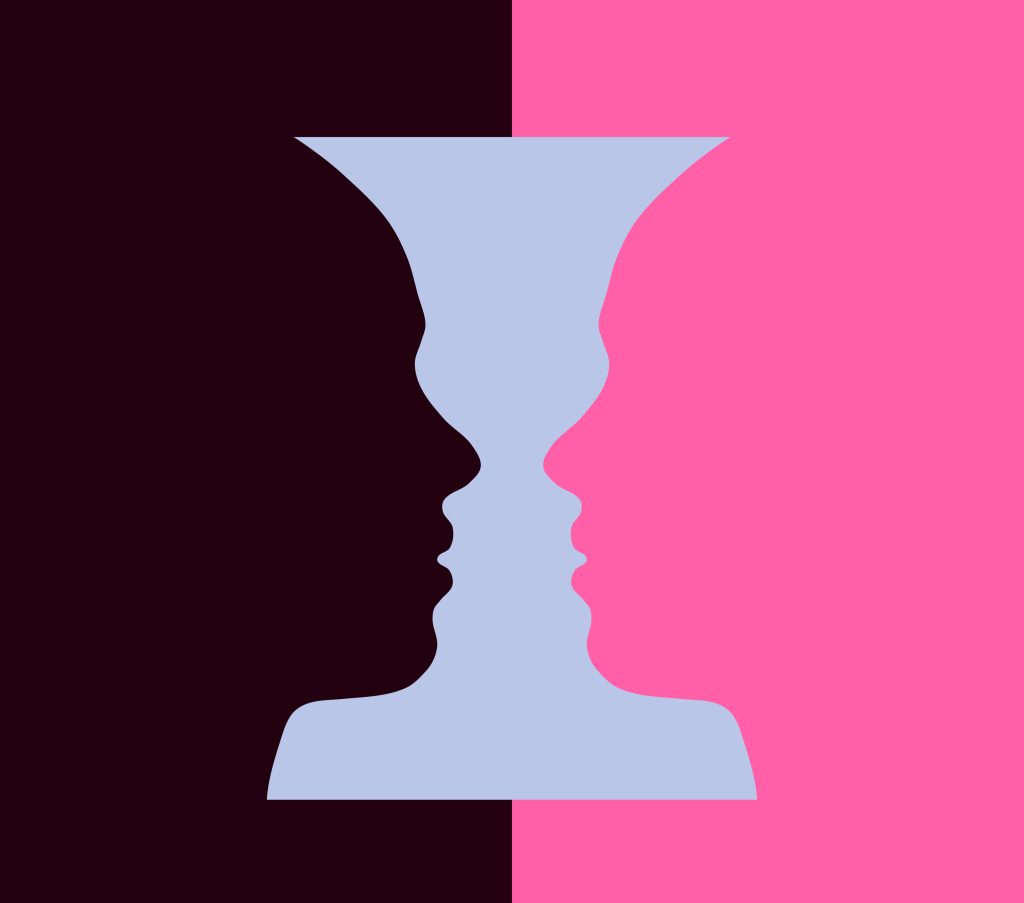What do you see when you look at this image? Do you see a carved goblet? Or do you see two faces, almost touching their noses?

What’s The First Thing You See?
Usually, you will see one image first, and once it is pointed out to you that there is another way to look at it, it is easy to see the second image.
Now You Will Always See Both!
And once you have seen both, if you are ever presented with this image again, you will still have a preference for seeing one image but will then be able to see the second one fairly quickly, having learned there is another way to view the picture.
Welcome to Cognitive Therapy!
I’ve just given you a way to understand why cognitive therapy can be so powerful and helpful to people who are interested in changing their lives. We all have ways that we view ourselves, people, our past, and even the way the world works based on the ways we were raised, the experiences we had growing up, various trials and traumas we may have experienced.
It Is Hard to Shift Our First View
You may know from your own experience how hard it can be to change how you view even one aspect of those things once your perspective seems to have “set.” You may see yourself as shy, damaged, irresponsible, out of control, easily influenced, highly addicted to things, or with low self-esteem coming out of your childhood or early adult life.
Cognitive Therapy Is A Second Look
Working with a therapist who utilizes cognitive and cognitive-behavioral therapy techniques as part of their practice allows you to begin to change the ways you see yourself, your past, others, and the world in the same way that where once all you saw was a black goblet, now you can see are the faces or vice-versa. It creates the ability to notice something new.
What Cognitive Therapy Can Do for You
Cognitive therapy opens your mind, and gives you options and perspectives to consider and use for making decisions that you may never have had access to before. Cognitive therapy can let you see things about yourself you never thought could be possible.
Cognitive therapy can allow you to consider reasons for others’ behavior that you may never have been able to consider with a previous worldview. Cognitive therapy can allow you to break free from negative or destructive habit patterns that are based on seeing things from only one perspective.
Cognitive Therapy’s Effectiveness

Although wise therapists utilize many different tools for helping their clients, cognitive and cognitive behavioral therapy has been well-researched and proven to be highly effective for a wide range of issues and is considered one of the “evidence-based” practices that all therapists should be familiar with.
For more information about CBT, take a look at the following resources:
- The Efficacy of Cognitive Behavioral Therapy: A Review of Meta-analyses
- Cognitive-Behavioral Therapy: Proven Effectiveness
- Cognitive Behavioral Therapy for Depression and Anxiety Disorders
Dr. Anita Sanz, PhD, Psychologist
How to Stop Procrastinating: A Three Step Plan
I’m probably the best procrastinator in the world. I could have procrastinated for England… if I got round to it and didn’t keep getting distracted by…
Progress by Erosion
Are You In “Project Purgatory?” You want to get your garage organized but you know you will never get an entire weekend to get it all…
Your Best Life Habits
As a psychologist, I’ve given this a lot of thought, because no matter what someone coming into therapy says they want to work on, eventually,…
How To Help Your Doctor Help You
You and I both know you are not a human Bento box. Trying to “unpack” your health experience by neat packages of symptom categories is not…
How To Avoid Getting Sick
Who Gets Sick? When Dr. Sheldon Cohen and his team at Carnegie Mellon University studied which participants became sick after having a cold or flu virus squirted in…
Keeping Grandma Healthy
Would You Know What To Do? You get the phone call that your 79-year-old grandmother has just been admitted to the hospital and when you get…
- Well Being (59)
- Life Hacks (20)
- The Big Picture (9)
- Health (10)
- Relationships (13)
- Holidays (7)
- Therapy (43)
- Anxiety (11)
- Depression (16)
- On The Couch (16)
- Life Planning (5)






